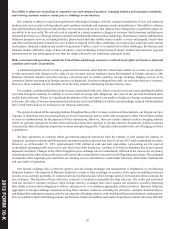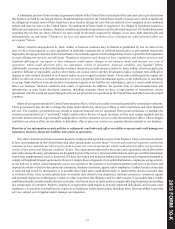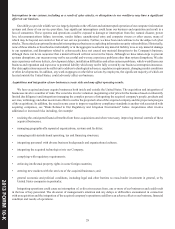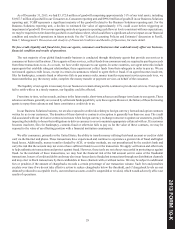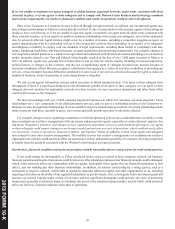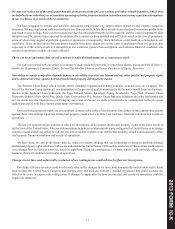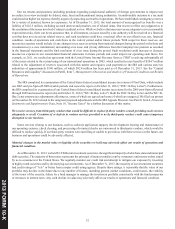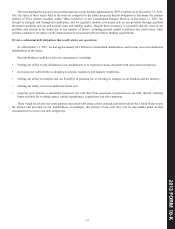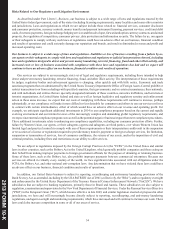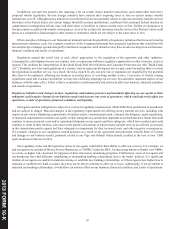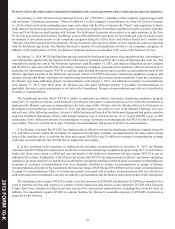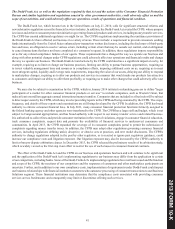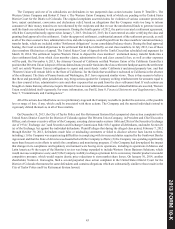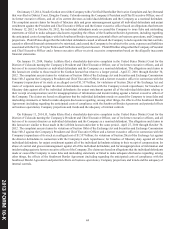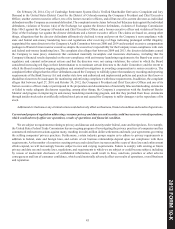Western Union 2013 Annual Report Download - page 146
Download and view the complete annual report
Please find page 146 of the 2013 Western Union annual report below. You can navigate through the pages in the report by either clicking on the pages listed below, or by using the keyword search tool below to find specific information within the annual report.
2013 FORM 10-K
36
In addition, one state has passed a law imposing a fee on certain money transfer transactions, and certain other states have
proposed similar legislation. Several foreign countries have enacted rules imposing taxes or fees on certain money transfer
transactions, as well. Although money transfer services themselves are not generally subject to sales tax on money transfer services
elsewhere in the United States, the current budget shortfalls in many jurisdictions, combined with continued federal inaction on
comprehensive immigration reform, may lead other states or localities to impose similar taxes or fees. Similar circumstances in
foreign countries could invoke similar consequences. A tax or fee exclusively on money transfer services like Western Union could
put us at a competitive disadvantage to other means of remittance which are not subject to the same taxes or fees.
Other examples of changes to our financial environment include the possibility of regulatory initiatives that focus on lowering
international remittance costs. For example, members of the Canadian parliament have proposed legislation that would limit the
fees and foreign exchange spreads charged by remittance companies. Such initiatives may have an adverse impact on our business,
financial condition and results of operations.
Regulators around the world look at each other's approaches to the regulation of the payments and other industries.
Consequently, a development in any one country, state or region may influence regulatory approaches in other countries, states or
regions. This includes the interpretation of the Dodd-Frank Wall Street Reform and Consumer Protection Act (the "Dodd-Frank
Act"). Similarly, new laws and regulations in a country, state or region involving one service may cause lawmakers there to extend
the regulations to another service. As a result, the risks created by any one new law or regulation are magnified by the potential
they have to be replicated, affecting our business in another place or involving another service. Conversely, if widely varying
regulations come into existence worldwide, we may have difficulty adjusting our services, fees and other important aspects of our
business, with the same effect. Either of these eventualities could materially and adversely affect our business, financial condition
and results of operations.
Regulatory initiatives and changes in laws, regulations and industry practices and standards affecting us, our agents or their
subagents could require changes in our business model and increase our costs of operations, which could adversely affect our
operations, results of operations, financial condition, and liquidity.
Our agents and their subagents are subject to a variety of regulatory requirements, which differ from jurisdiction to jurisdiction
and are subject to change. Material changes in the regulatory requirements for offering money transfer services, including with
respect to anti-money laundering requirements, fraud prevention, consumer protection, customer due diligence, agent registration,
or increased requirements to monitor our agents or their subagents in a jurisdiction important to our business have meant and could
continue to mean increased costs and/or operational demands on our agents and their subagents, which have resulted and could
continue to result in their attrition, a decrease in the number of locations at which money transfer services are offered, an increase
in the commissions paid to agents and their subagents to compensate for their increased costs, and other negative consequences.
For example, changes to our compliance-related practices as a result of our agreement and settlement with the State of Arizona
and changes to our business model, primarily related to our Vigo and Orlandi Valuta brands, resulted in the loss of over 7,000
agent locations in Mexico in 2012.
Our regulatory status and the regulatory status of our agents could affect their ability to offer our services. For example, we
and our agents are considered Money Service Businesses, or "MSBs," under the BSA. An increasing number of banks view MSBs,
as a class, as higher risk customers for purposes of their anti-money laundering programs. Furthermore, some of our agents and
our businesses have had difficulty establishing or maintaining banking relationships due to the banks' policies. If a significant
number of our agents are unable to maintain existing or establish new banking relationships, or if these agents face higher fees to
maintain or establish new bank accounts, they may not be able to continue to offer our services. Additionally, if we are unable to
maintain our banking relationships, it would have an adverse effect on our business, financial condition, and results of operations.


